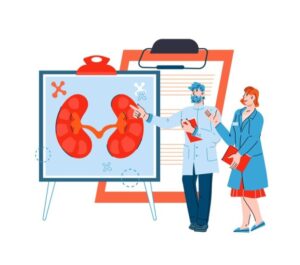Introduction:
Urinary tract infection (UTI) is a common problem that can affect both men and women. It occurs when harmful bacteria, especially E. coli, enter the urinary tract and cause an infection. The urinary tract includes the kidneys, bladder, urethra, and ureters, and this infection can affect any part of them. This disease is more common in women because their urethra is smaller than that of men.
This allows bacteria to easily reach the bladder. Symptoms of a UTI include frequent urination, burning or pain during urination, cloudy or foul-smelling urine, blood in the urine, and abdominal or back pain. In men, these symptoms can manifest as difficulty urinating, a weak stream, blood in the urine, and sometimes abnormal discharge from the penis.
Severe cases may include fever, chills, nausea and severe back pain. Causes of UTIs include poor hygiene, pregnancy, hormonal changes, and intercourse in women, and prostate problems, urinary obstruction, and catheter use in men. Urine tests and sometimes imaging tests are used to diagnose this disease. Antibiotics are used to treat such as nitrofurantoin, ciprofloxacin, and amoxicillin, while phenazopyridine is prescribed for irritation or discomfort. Women are given a course of 3 to 7 days, while men require a course of 7 to 14 days. To avoid a UTI, it is important to maintain good hygiene, drink plenty of water, urinate after sex, and avoid scented soaps or douches. If not treated in time, this disease can lead to serious problems like permanent kidney damage or sepsis.
Cranberry juice and probiotics can be helpful natural remedies. If severe symptoms or recurrent infections occur, consult a doctor immediately.

Symptoms of a Urinary tract infection.
Symptoms of a Urinary tract infection can vary from person to person and depend on the severity of the infection and the area affected. In women, common symptoms include frequent urination, burning or pain during urination, foul-smelling urine, blood in the urine, and pain in the lower abdomen or back.Women need to urinate frequently but pass very little urine, and with great discomfort. In men, these symptoms may include difficulty urinating or a weak stream, burning or pain during urination, pain in the lower abdomen or back, and sometimes abnormal discharge from the penis. If the infection affects the kidneys, the symptoms can be more serious. These include fever, chills, nausea, vomiting, severe back or side pain, and unusual tiredness. Seek immediate medical attention in this condition as it can cause permanent kidney damage or be life-threatening like sepsis.
Causes of Urinary tract infection.
Causes of UTI The causes of UTI can be different in women and men. In women, this disease is usually caused by bacteria reaching the bladder through the urethra, which can be transmitted through poor hygiene or during intercourse.
Hormonal changes and stress on the bladder during pregnancy can also increase the risk of UTIs, while the loss of estrogen after menopause weakens the walls of the urinary tract.
This increases the risk of infection. On the other hand, UTIs in men are usually caused by prostate problems, urinary obstruction (such as kidney stones), or urethral strictures, which affect urine flow and allow bacteria to grow.
Prolonged urinary catheter use or poor hygiene practices also increase the risk of UTI. To avoid all these factors, it is very important to follow cleaning and preventive measures.
Diagnosis of UrinarAntibiotics.
Doctors diagnose UTI in the following ways:
1. Urinalysis: A urine sample is evaluated for the presence of bacteria, blood, or pus.
2. Urine culture: Determines the type of bacteria causing the infection.
3. Imaging tests: An ultrasound or CT scan may be done for recurrent UTI.
Urinary tract infection treatment and medication.

1. Antibiotics
Nitrofurantoin (Macrobid): Given for common UTI.
Trimethoprim/sulfamethoxazole (Bactrim): Effective but not suitable for everyone.
Ciprofloxacin (Cipro): Used for severe infections.
Amoxicillin: Given for mild cases.
Treatment for women.
A 3- to 7-day course of antibiotics is sufficient for a minor UTI.
nant women may be given a longer course of certain antibiotics, such as amoxicillin.
Treatment for men.
Men are usually given a longer course of 7 to 14 days, especially if the prostate is affected.
Severe infections may require IV antibiotics.
Ways to prevent Urinary tract infection.
For Women
Pay special attention to cleanliness: Always clean from front to back after using the bathroom.
Drink more water: Drink more water to flush out bacteria.
Urinate after sex: Helps flush out bacteria.
Avoid scented soaps: Avoid scented soaps, sprays or douches on sensitive areas.
For Men
Urinate thoroughly: Urinate thoroughly to prevent bacteria build-up.
Take care of cleanliness: Take special care of personal hygiene.
Do not hold urine: Do not hold the urge to urinate for long.
Complications of Urinary tract infection.
If not treated in time, UTI can cause the following serious complications
1. Kidney Diseases: Permanent kidney damage can occur.
2. Sepsis: A dangerous condition where infection spreads to the blood.
3. Recurrent infections: Recurring infections may require further examinations and precautions.
Home remedies and ways of living.
1. Cranberry Juice: Can help prevent bacteria from sticking.
2. Probiotics: Help maintain healthy bacteria in the urinary tract.
3. Wear loose clothing: Wearing cotton underwear and loose clothing reduces moisture.
4. Dietary changes: Avoid caffeine, alcohol and spicy food during infection.
When to see a doctor?
Consult a doctor if:
Have severe pain or fever.
Pain persists despite treatment.
Recurrent Urinary tract infection.
Conclusion.
A UTI is a common but treatable condition that can affect both men and women. Understanding the symptoms, causes and treatment is essential to preventing the disease.
If you suspectUrinary tract infection (UTI) and its solution.A UTI, see a doctor immediately. You can prevent UTIs by following hygiene and precautions.
